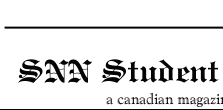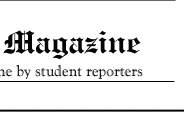 |
 |
|||||
 |
||||||
 |
||||
 |
||||
 |
||||
|
PROFILE A Valuable Resource By Karen Buhler, Grade 12, Garden Valley Collegiate, Winkler, MB Scholastic Journalism by Earl English, Clarence Hach, and Tom E. Rolnicki, is a "must have" for every young journalistic writer. I did work experience for four months at the Winkler Times last semester. As I read through Scholastic Journalism, I realized how much easier my job would've been with this book at my fingertips. Things I needed to know (and much more) are discussed in detail. Scholastic Journalism is written in simple, everyday language and the text is organized in point form. Eight different sections cover everything from writing news, headlines, and leads to obtaining your information and dealing with professional mass media. Each section is divided into subsections. The chapters on understanding, gathering and writing news cover such topics as conducting interviews and writing leads, feature stories, sports stories, editorials and reviews. Each chapter defines the topic, reviews the qualifications needed to write that sort of article, discusses the parts of a good article, and then shows several examples of that type of article, pointing out both strengths and weaknesses. Most of the chapters include one or two quotes from a professional media person on the particular topic that is being discussed. Here is advice for a beginner from a professional, Veronica T. Jennings, Minority Affairs Director, American Society of Newspaper Editors: "Three pieces of advice: A) Read, read, read. There is no better preparation than a curious mind, an insatiable appetite for information on local, national and international events. B) Write, write, write. Good reporting skills must be coupled with good writing to tell a readable compelling story. C) Obtain as many internships as possible; the experience and contacts are invaluable." Sig Gissler, Former Editor, Milwaukee Journal, offers advice for both beginners and experts: "For fairness in reporting," he says, "put yourself in the shoes of the person you are writing about and ask: Would I consider this fair to me?" Mr. English, one of the authors, is a professor and dean of emeritus in the School of Journalism, University of Missouri, Columbia. In 1991, he was among the first inductees into the Missouri Press Association Newspaper Hall of Fame. Mr. Hach was a journalism and English teacher for many years. And Mr. Rolnicki is the executive director of the National Scholastic Press Association and the Associated Collegiate Press at the University of Minnesota. He is also a former high school journalism teacher. I think all of us can agree with Robert and Betty Van Leer, Publishers, Curry County Reporter, Gold Beach, Oregon when they say, "Journalism is a profession that will never be obsolete. By their very nature human beings are curious about one another and what goes on around them. Since people are limited in what they can explore for themselves, they are quite willing to pay someone else to do the exploring for them." That is why there are journalists, but it goes deeper than that. R. Richard Hood, Vice President and Editorial Page Editor, Kansas City Star said it well: "Journalism has taken me to Europe and most of the states in the country. It has opened doors of opportunity I could not have imagined as a boy on the Ozarks farm where I grew up. It has given me opportunity to observe and interview many of the most important thinkers, philosophers, and political leaders of the past three decades. Journalism has given me the opportunity to make a significant difference in my community, my state and sometimes even my country." People have a deep sense of commitment to their country and what it represents. Deep down in most of us is a desire to be successful and contribute to our society. For any young journalist, reading Scholastic Journalism is a step in the right direction. |